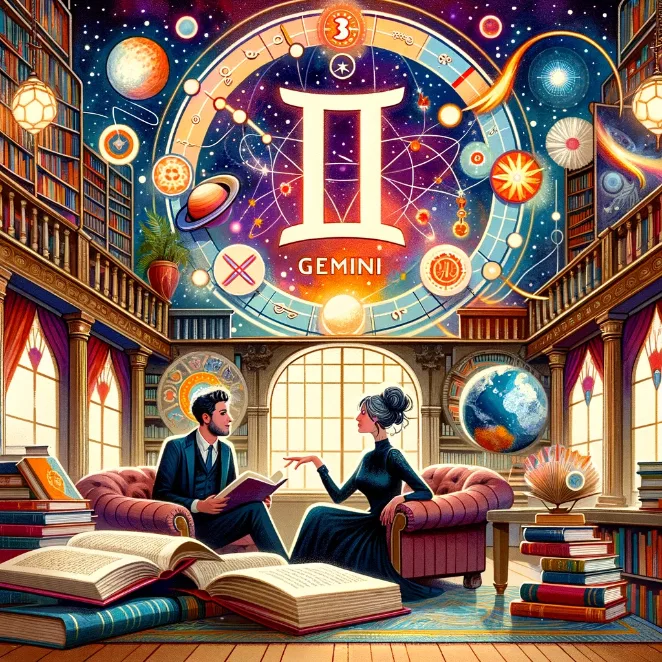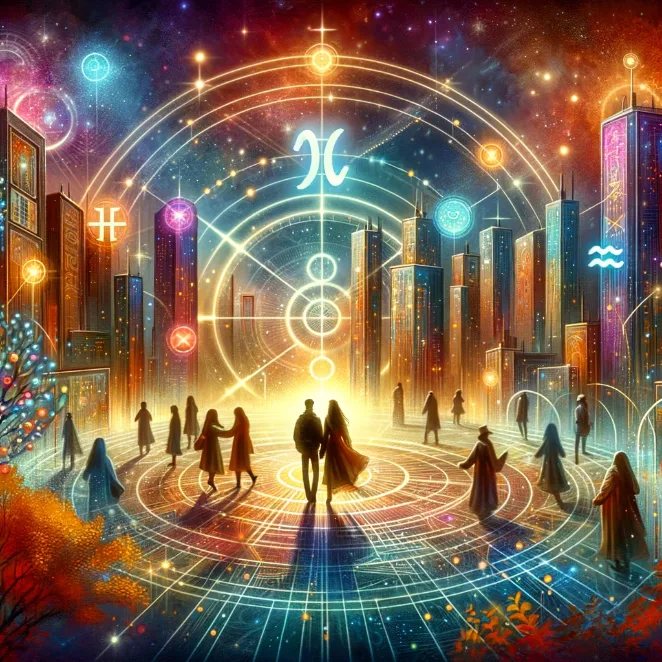
Synastry's Astrological Houses: The Blueprint for Relationship Harmony
Astrological houses in synastry offer a profound and nuanced view of relationship dynamics. Each house represents a unique area of life, and when we explore how our partner's planets fall into these houses in our own chart, we unlock a world of deep insights. This celestial guide provides an understanding of how two individuals blend their energies in various aspects of life, from personality expression to career, home life, and more. Let's embark on a journey through each astrological house to discover how they lay the foundations for strong, harmonious relationships.
article by Sofia Ferguson
First House: Self-Image and First Impressions
The First House, often associated with Aries, is the house of self and identity. In synastry, planets falling into a partner’s First House influence initial attraction and basic personality interactions. This house governs first impressions, physical appearance, and the outward personality. A harmonious First House synastry suggests a natural ease in expressing oneself and an immediate attraction or connection. However, challenges in this house can lead to conflicts in self-expression or identity, making it important to maintain individuality and self-awareness within the relationship.
Second House: Values and Material Security
Ruled by Taurus, the Second House in synastry deals with values, material possessions, and security. It reflects how couples might align financially and in terms of values. When planets from one partner’s chart fall into the other’s Second House, it highlights the potential for shared or conflicting attitudes towards money, possessions, and what each values most in life. This house encourages discussions about financial stability, resources, and the material aspects of life, fostering a better understanding of how to build a secure future together.
Third House: Communication and Thought Processes
Governed by Gemini, the Third House is all about communication, thinking patterns, and everyday exchanges. This house reveals how a couple communicates and intellectually connects. Planets in this house in synastry can indicate a harmonious flow of ideas and a mutual understanding of each other’s thought processes, or conversely, highlight areas where communication may require extra effort. Effective communication is the cornerstone of any strong relationship, making this house particularly significant in synastry.

Fourth House: Home Life and Emotional Security
The Fourth House, associated with Cancer, represents home, family, and emotional foundations. It shows how partners create a sense of home and security together. When a person’s planets fall into their partner’s Fourth House, it influences feelings of comfort, belonging, and emotional connections within the relationship. This house is crucial in understanding how each partner views family life, traditions, and their shared living space, contributing to the nurturing and emotional support within the relationship.
Fifth House: Romance and Creativity
Leo rules the Fifth House, the realm of romance, creativity, and children. It's where passion, pleasure, and artistic expression come to life. In synastry, this house influences how a couple experiences joy, romance, and leisure activities together. A positive Fifth House connection can lead to a vibrant, playful, and loving relationship, while challenges might bring issues in romance, creativity, or disagreements about children. This house is key to understanding how a couple shares and enjoys life's pleasures.
Sixth House: Daily Routines and Health
Virgo governs the Sixth House, which focuses on daily routines, work, and health. This house in synastry reveals how a couple manages everyday life, work habits, and physical well-being. It's about the practical aspects of a relationship, such as how chores are divided or how health and fitness are approached. A strong connection in the Sixth House can lead to a harmonious and efficient partnership in daily life, while challenges can indicate a need for better organization or health management.
Seventh House: Partnerships and Marriage
The Seventh House, linked to Libra, is traditionally known as the house of marriage and partnerships. It represents long-term committed relationships and how a couple interacts as equal partners. In synastry, planets in the Seventh House suggest how a couple will navigate their partnership, handle conflicts, and support one another. A harmonious Seventh House indicates a strong, balanced relationship, while challenges here can highlight areas of compromise and cooperation that need attention.
Eighth House: Intimacy and Shared Resources
Scorpio rules the Eighth House, a realm of deep emotional connections, intimacy, and shared resources. This house in synastry delves into how a couple handles deeper emotional bonds, sexual intimacy, and shared finances or possessions. A strong Eighth House connection suggests a deep, transformative relationship, while challenges can indicate issues in trust, intimacy, or financial matters. This house is key to understanding the depth and intensity of the relationship.
Ninth House: Beliefs and Adventure
The Ninth House, under the influence of Sagittarius, relates to higher learning, beliefs, and long-distance travel. It shows how a couple grows and explores together, both intellectually and physically. A harmonious Ninth House synastry suggests a relationship full of adventure, learning, and shared philosophical or spiritual pursuits. Challenges in this house might indicate differences in belief systems or desires for exploration, underscoring the importance of openness and growth in the relationship.

Tenth House: Career and Public Life
Capricorn’s Tenth House is about career, reputation, and public life. In synastry, this house reflects how a couple supports each other’s ambitions and how their relationship is viewed publicly. A positive Tenth House connection indicates mutual support in career goals and a harmonious public image, while challenges can highlight conflicts between professional aspirations and the relationship’s needs. This house encourages a balance between personal and professional life within the partnership.
Eleventh House: Friendships and Social Circles
Aquarius oversees the Eleventh House, the house of friendships, hopes, and social connections. This house in synastry explores how a couple fits into each other's social circles and their shared dreams for the future. A strong Eleventh House connection suggests a couple who enjoys a vibrant social life and aligns on future aspirations, while challenges can point to differences in social needs or future goals. Nurturing a shared social life and supporting each other's dreams are crucial aspects of this house.

Twelfth House: Secrets and Subconscious
The Twelfth House, associated with Pisces, represents the subconscious, secrets, and hidden aspects of life. In synastry, this house reveals the deeper, often hidden elements of the relationship, including unspoken feelings, fears, and dreams. A harmonious Twelfth House can lead to a deep, soulful connection, while challenges can bring out hidden issues or misunderstandings. Understanding and navigating this house requires trust, vulnerability, and open communication.
The astrological houses in synastry provide a comprehensive map of how two individuals interact and complement each other in various life areas. From self-expression and values to career and subconscious dynamics, each house offers unique insights into the relationship’s strengths and areas for growth. By exploring these houses, couples can gain a deeper understanding of their partnership, laying strong foundations for a lasting and fulfilling relationship.
Published: 11/24/2023
Modified: 11/24/2023
More predictions
Come back here soon to learn more about yourself and your future


Harmonizing Hearts: Exploring Birthday Compatibility in Relationships
The concept of birthday compatibility has long fascinated those seeking deeper understanding in relationships. At its core, this idea revolves around the belief that the date of our birth can influence our personality traits, preferences, and, ultimately, our compatibility with others. This approach combines elements of astrology, numerology, and even psychological theories to decode the mysterious rhythm of birthdays. The quest to understand how our birth dates align or clash with those of our partners is more than a curiosity; it’s a journey into the heart of interpersonal dynamics.


Decoding Compatibility: Myths and Realities
In the quest for fulfilling relationships, the concept of compatibility often emerges as a central theme. However, numerous myths surround this concept, leading to misconceptions about what truly constitutes a compatible partnership. These myths can skew expectations and hinder the formation of healthy relationships. This article aims to dissect some of these myths and contrast them with realities, offering a clearer understanding of what compatibility really means in relationships.


Roots of Love: Upbringing and Relationship Choices
The connection between one's upbringing and their adult relationship choices is a subject of profound significance. Our childhood experiences, interactions with parents and caregivers, and the emotional environment of our early years lay the groundwork for how we approach relationships later in life. These formative experiences can influence our relationship preferences, attachment styles, and even the way we communicate love and affection. This article delves into the intricate ways in which our upbringing shapes our romantic lives, offering insights into the subtle yet powerful impact of our earliest experiences on our adult relationships.